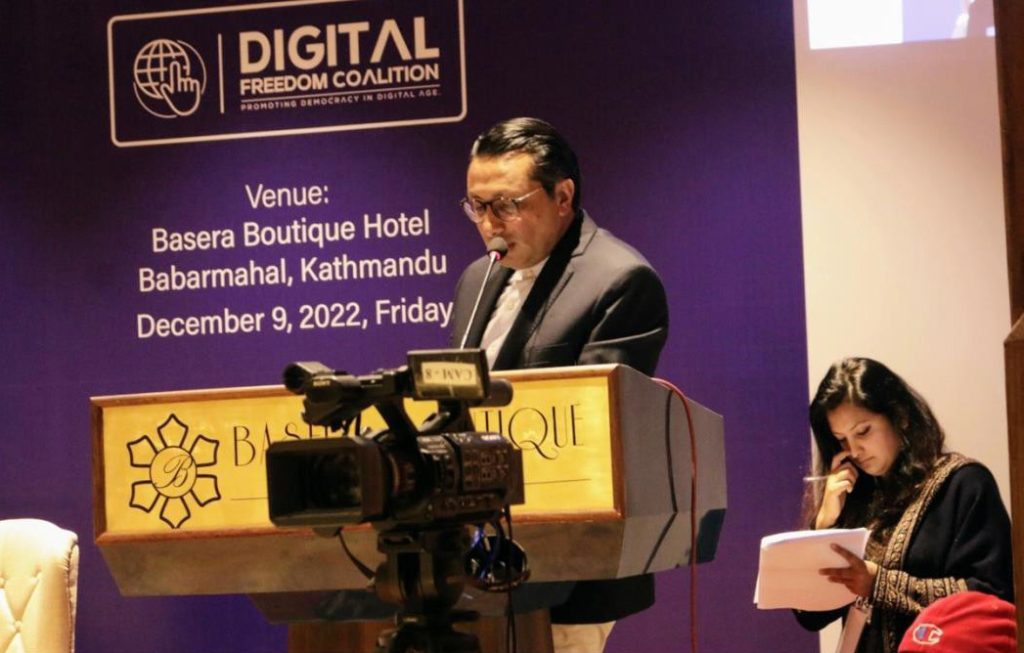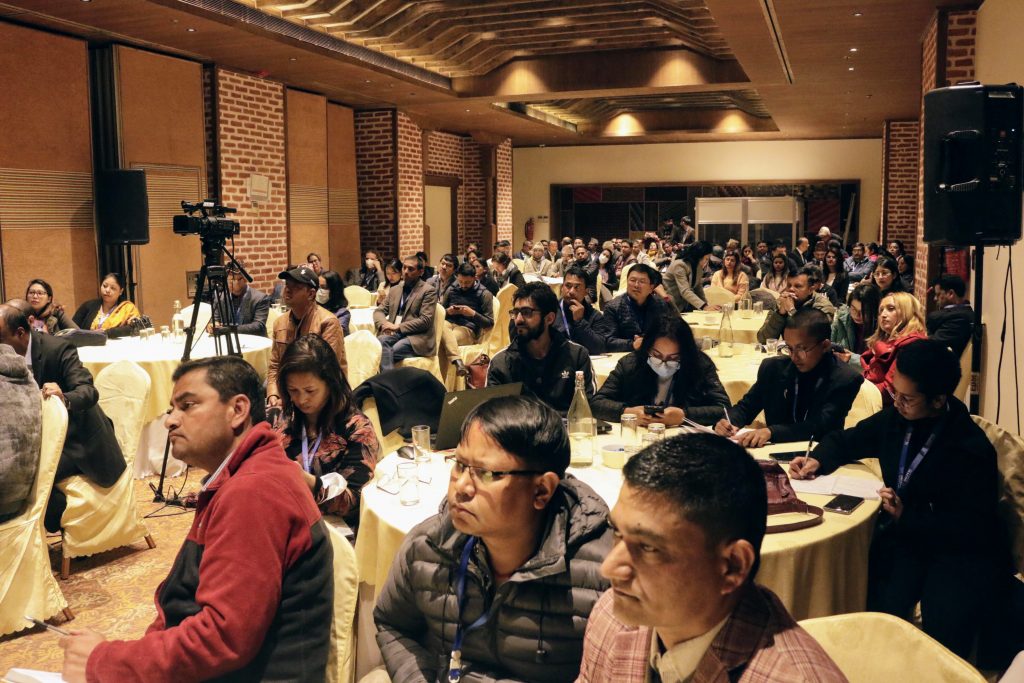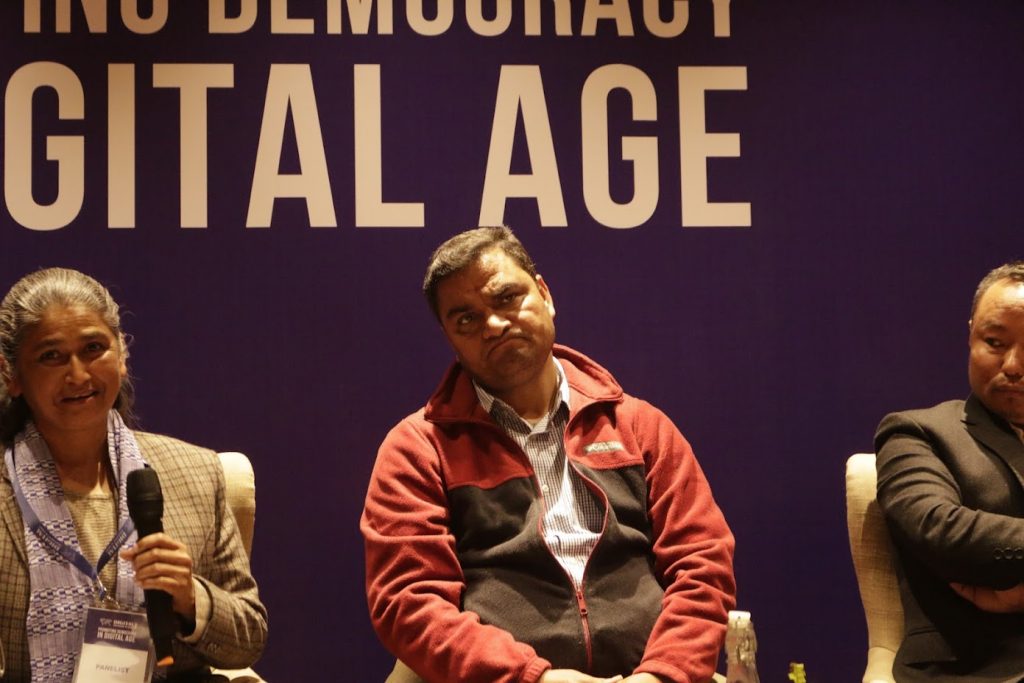Digital Freedom Summit Wraps up with Spotlight on Democracy in the Digital Era

The first Digital Freedom Summit successfully held on December 9, 2022, having theme of “Promoting Democracy in the Digital Age” and coincided with World Human Rights Day. The event serves as a multi-stakeholder platform where participants discuss various issues related to digital freedom in the country.
The summit provided a platform for diverse stakeholders to engage in meaningful discussions about Nepal’s digital future. It highlighted the opportunities and challenges that come with digitization and emphasized the need for coordinated efforts to ensure equitable access, privacy protection, and responsible usage of digital technologies.Top of Form
The organizer, Digital Freedom Coalition comprises seven organizations, including Digital Media Foundation, Internet Governance Institute, Forum for Digital Equality, Media Action Nepal, Educating Nepal, Youth IGF Nepal, and Antenna Foundation Nepal.
The event had participation of more than 200 individuals and received support from notable organizations such as the Nepal Telecommunications Authority, Press Registrar’s Office (Bagmati Province), Nepal Telecom, BizBazar Ltd., and Internet Society Education SIG.
The first panel discussion, “Democracy in the Digital Age: Political Perspective,” was moderated by Mr. Laxman Datt Pant, Chairperson of Media Action Nepal. The panelists included Hon. Dr. Binda Pandey, Member of Parliament from CPN UML; Hon. Pradip Poudel, Member of Parliament from Nepali Congress; Mr. Ashim Rai, Chairman of Thulung Dudhkoshi Gaupalika; and Prof. Pitambar Bhandari, from the Department of Conflict, Tribhuvan University.
The panel discussed the evolution of democracy in the digital age, highlighting the role of digital platforms in enabling public expression and ensuring good governance. While acknowledging the benefits of the internet as a medium for reaching a wider audience, the panelists also raised concerns about challenges such as misinformation, disinformation, and the rapid spread of fake news. They emphasized the need to safeguard freedom of expression in the digital age and develop strategies to overcome these challenges.
Mr. Datt Pant pointed out the importance of proper implementation of international treaties and conventions and criticized attempts by the government to control and restrict citizens’ freedom of expression on social media and other digital platforms through regulations that undermine international treaties and the constitution itself.
Prof. Bhandari highlighted how the voices of marginalized communities often get overshadowed by mainstream political aspirations, both in the digital and non-digital era. While social media and digital platforms have increased access to a wider audience, he noted that confusion still exists among the public regarding political aspirations, philosophies, and parties.
Dr. Pandey, experiences of adapting to digital services. She highlighted the challenges faced in the past, such as receiving MP salaries by cheques, and advocated for the use of electronic banking services. Dr. Pandey also discussed the debates surrounding the use of electronic devices in parliament and emphasized the importance of live streaming parliamentary meetings. She called for all levels of government to embrace information and communication technology (ICT) for efficient public service delivery.

Mr. Poudel, another panelist, highlighted the digital divide between urban and rural areas in Nepal. He discussed the role of digital technology in his recent election campaign, enabling him to connect with voters without physical meetings. However, he cautioned against the spread of fake news and misinformation on digital platforms and stressed the need for responsible usage.
Mr. Rai raised concerns about the quality of digital infrastructure and services in rural Nepal. He shared the success story of Thulung Dudh Koshi Rural Municipality in implementing an online taxation system, emphasizing the importance of coordination between ward offices.
During the keynote session, Dr. Swarnim Wagle discussed democracy in the digital age, addressing the economic, sociological, and techno-political aspects. He highlighted the inclusive nature of digital literacy, increased access to education, and the growth of the digital economy. However, he also emphasized the need to address the challenges of democratization and misinformation, urging for education and awareness to combat the spread of false information.
In the panel discussion on infrastructure and content, panelists discussed the need for equitable access to digital services. They emphasized the role of the newly formed e-Governance Commission in bridging the gap between government service delivery and the use of ICTs. Accessibility, digital literacy, and the regulation of online platforms were also key points of discussion.

The symposium’s final session focused on the digital economy and its future in Nepal. Panelists discussed the need for digital literacy, the challenges faced by the banking sector, and the importance of data privacy and security. The lack of digital infrastructure, policy gaps, and regulatory mechanisms were identified as hurdles to be addressed for the growth of the digital economy.
In his closing remarks, Dr. Ganesh Raj Pandey, Secretary of the Office of Prime Minister and Council of Ministers, commended the symposium for its insightful discussions. He encouraged the coalition to submit recommendations and reports to the respective ministries, acknowledging the importance of public and private sector collaboration for Nepal’s digital transformation.
